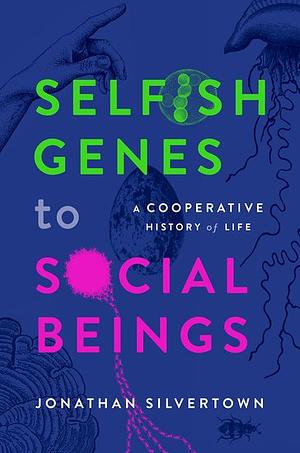
Selfish Genes to Social Beings: A Cooperative History of Life
by Jonathan Silvertown
Genres: Non-fiction, SciencePages: 256
Rating:

Synopsis:For all the "selfishness" of genes, they team up to survive. Is the history of life in fact a story of cooperation?
Amid the violence and brutality that dominates the news, it's hard to think of ourselves as team players. But cooperation, Jonathan Silvertown argues, is a fundamental part of our make-up, and deeply woven into the whole four-billion-year history of life. Starting with human society, Silvertown digs deeper, to show how cooperation is key to the cells forming our organs, to symbiosis between organisms, to genes that band together, to the dawn of life itself. Cooperation has enabled life to thrive and become complex. Without it, life would never have begun.
I wasn’t a big fan of Jonathan Silvertown’s Selfish Genes to Social Beings. Ultimately, it’s as the subtitle (“A Cooperative History of Life”) suggests, rather than focusing on the question of how cooperation arises from “selfish” genes, or trying to dissect the evolution of altruism. It’s probably best read keeping that in mind.
Even so, I found it slow, and sometimes strangely organised. It works back through time… more or less. Sometimes it’s more like it’s working back through scale, finding fresh simulated surprise as smaller and smaller living things turn out to cooperate (a fact which should not be a surprise, since we know our own individual genes must cooperate). Sometimes the examples didn’t really contribute to a narrative, and I found the pop-culture references (like references to songs) cringey, like Silvertown was trying to add readability through pasting in some song lyrics.
Whiiiich is the other problem: I couldn’t put my finger on why, exactly, but I constantly found my attention wandering before the end of a paragraph — or sometimes, the end of a sentence. It’s not that I can’t focus on this kind of thing, because I love reading non-fiction. It’s also not that I know it all already (though I did), because I can happily read popular science about my pet subjects even when it contains absolutely nothing new. What’s required is usually just enthusiasm and a will to put across one’s own point of view.
I did find some of his later chapters more interesting, since his discussion of the RNA World hypothesis went deeper into it than my previous reading, but I still found this a very slow read and, ultimately, not for me. The stuff about kin selection has been discussed ad nauseam in many other books, and I didn’t feel that anything particularly fresh was added to the discussion.
Rating: 2/5

Sorry you found this disappointing, thanks for sharing your thoughts